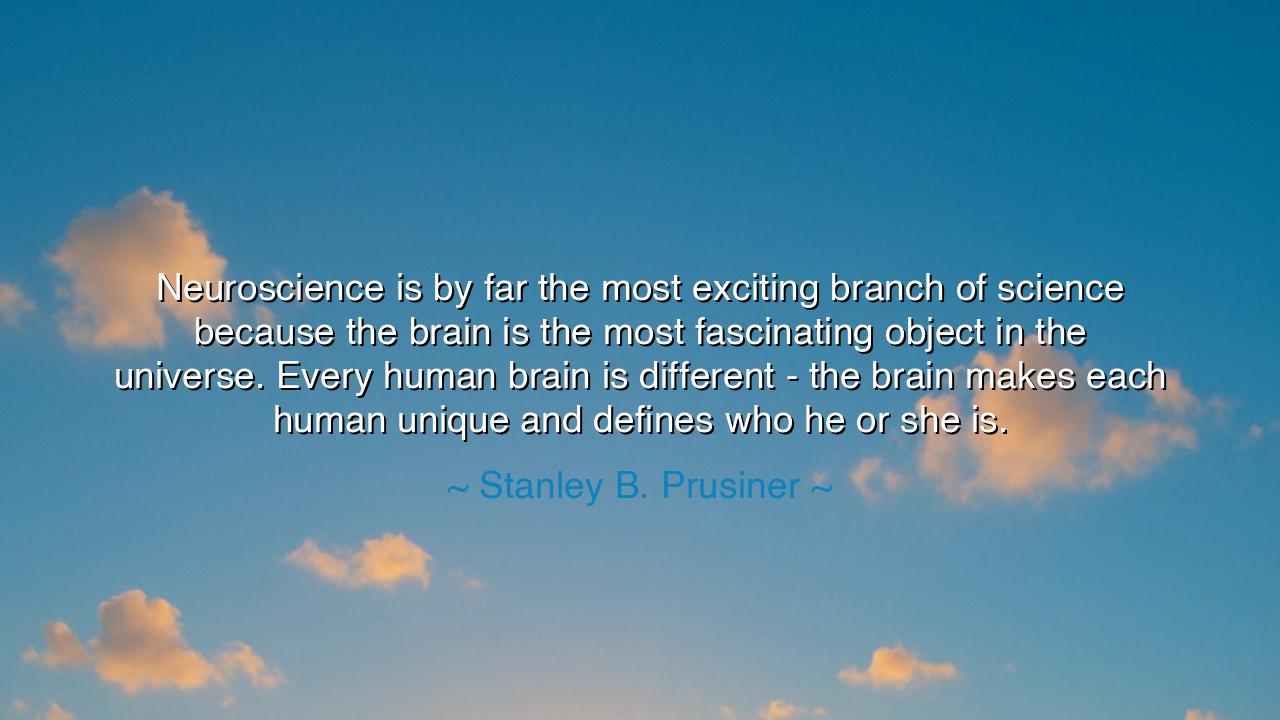
Neuroscience is by far the most exciting branch of science
Neuroscience is by far the most exciting branch of science because the brain is the most fascinating object in the universe. Every human brain is different - the brain makes each human unique and defines who he or she is.






"Neuroscience is by far the most exciting branch of science because the brain is the most fascinating object in the universe. Every human brain is different - the brain makes each human unique and defines who he or she is." These words, spoken by the visionary Stanley B. Prusiner, resound like a call to honor the profound mystery of the human brain. In them, we hear not just the excitement of discovery, but a deep reverence for the singularity of each individual, for the brain, with its complexity and power, shapes not only how we experience the world, but who we are. The brain is the vessel of consciousness, the seat of intellect, and the source of all human experience. It is, as Prusiner so passionately suggests, the most fascinating object in the universe, for it holds the essence of what it means to be human.
In the ancient world, the study of the mind and soul was a quest that consumed the greatest of minds. The Greek philosophers often debated the nature of the soul, the mind, and their relationship to the physical body. Plato, in his dialogues, posited that the soul was the true essence of the individual, while the Aristotelian tradition saw the mind and body as interconnected. Yet, while the ancients could only speculate about the nature of the mind, they understood that consciousness was the defining feature of the human experience. The mind, they believed, was what made us unique and gave us the capacity to reason, to imagine, and to create. It was from this early contemplation that the seeds of neuroscience were planted, as thinkers pondered what lay within the very fabric of human existence.
Prusiner’s words shine a light on the modern scientific breakthrough that allows us to glimpse the inner workings of the brain itself. Through the lens of neuroscience, we are beginning to understand how the brain’s intricate network of neurons, chemicals, and electrical impulses gives rise to thoughts, memories, and emotions. Each brain is a unique configuration, a living tapestry of experience and genetic inheritance, sculpting the very essence of the person. Just as the ancients sought to understand the soul, today’s neuroscientists seek to understand the mechanisms of the brain, for within its folds lies the key to what makes each of us who we are. The uniqueness of every human brain, with its intricate patterns and connections, mirrors the diversity of human experience and the complexity of the self.
Consider the remarkable story of Phineas Gage, a man whose accident forever altered our understanding of the brain. In 1848, Gage was a railroad foreman who survived a horrific accident in which a large iron rod was driven through his skull, damaging his frontal lobe. Remarkably, Gage lived, but his personality underwent a drastic transformation. He became impulsive, irritable, and irresponsible, behaviors that were in stark contrast to his former, more stable demeanor. This case was one of the first to show that the brain could influence personality and behavior, and it became a cornerstone in the study of neuroscience, highlighting the central role of the brain in shaping who we are. Through Gage’s experience, scientists began to see that the brain, while physically defined, is also the source of our identity, our actions, and our consciousness.
Prusiner’s statement, though rooted in the science of the brain, also touches upon a profound philosophical truth: that each person is defined not just by their body, but by their mind, which resides in the complex neural network of their brain. It is through the brain that we understand the world, experience emotions, and make decisions. But it is also through the brain that we express our unique humanity. This understanding calls us to see not just the physical body, but the mind as the truest reflection of an individual. The great diversity of human experience, the thoughts and dreams that define us, arise from this uniquely individual organ, which, though composed of the same elements in all of us, is as distinctive as a fingerprint. The brain is not merely a biological machine—it is the essence of the self.
The lesson Prusiner offers is not just one of scientific wonder; it is a reminder of the value of each individual. The uniqueness of the brain is a celebration of the diversity of human experience. Each of us, in the configuration of our neurons and synapses, carries a distinct history, a unique capacity for thought, and an unparalleled potential for creativity and growth. This understanding of the brain encourages us to embrace the inherent worth of each person, not just for what they do, but for who they are in the deepest sense. It is a call to celebrate the individuality of each human being and to honor the complexity of the human mind.
In your own life, remember that you are not merely a body; you are a mind, shaped by your experiences, your thoughts, and your unique brain. Seek to understand not just the physical world, but the very nature of consciousness within you. Understand that your thoughts, emotions, and experiences are not mere accidents—they are the product of a deeply complex and unique structure. Honor your own mind and the minds of others, for in each of us lies a universe of possibility. Just as neuroscience is opening new doors to understanding the brain, so too can we open new doors to understanding ourselves. The brain is not just an organ; it is the very foundation of who we are, and in understanding it, we unlock the deepest mysteries of the self.






AAdministratorAdministrator
Welcome, honored guests. Please leave a comment, we will respond soon